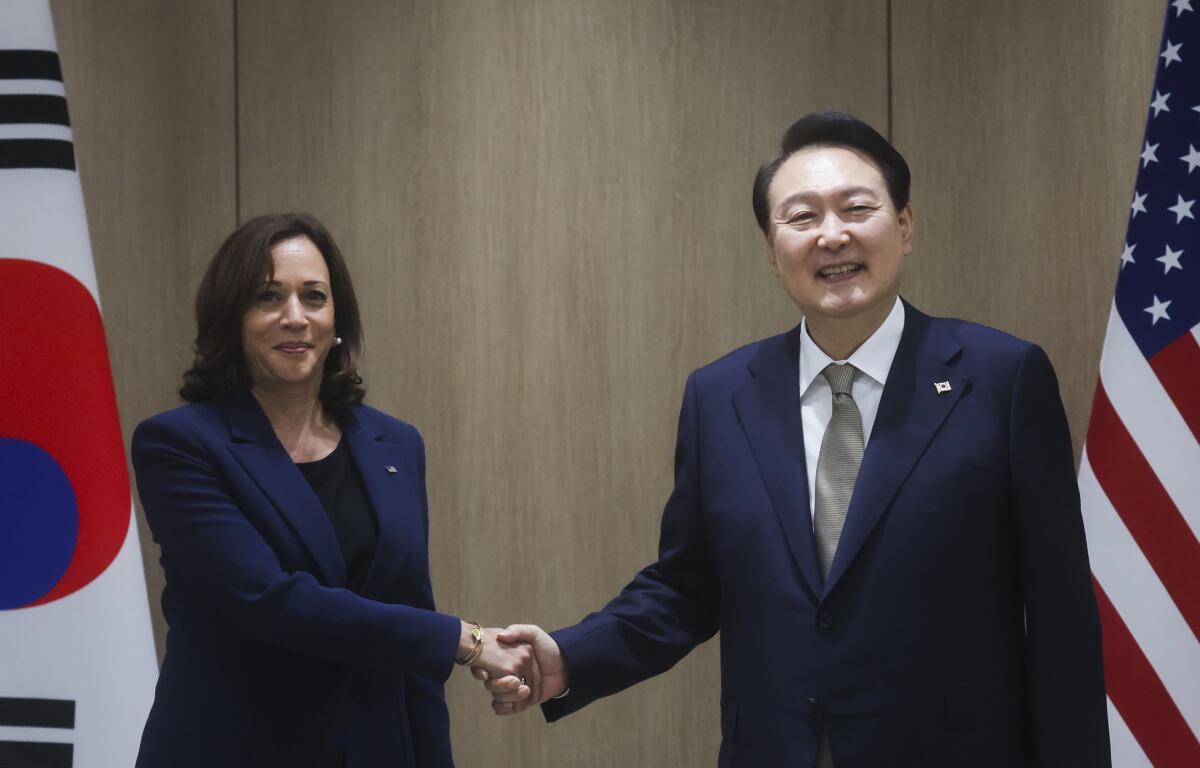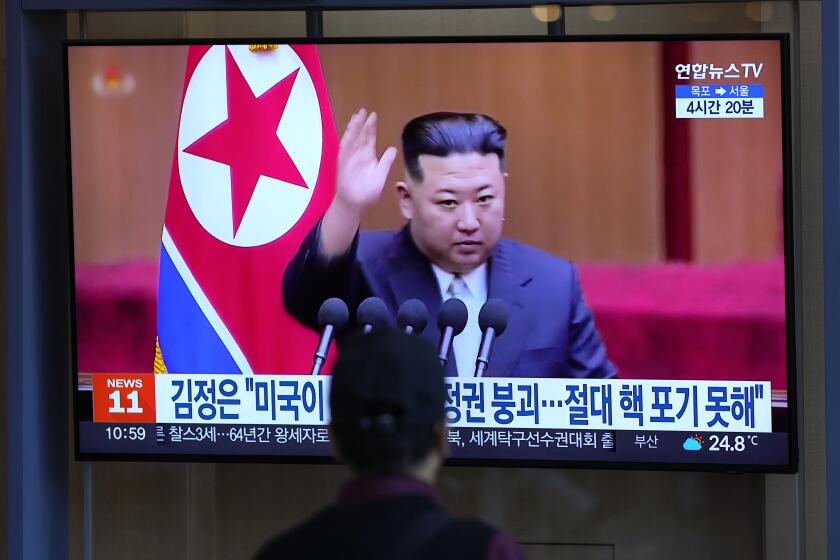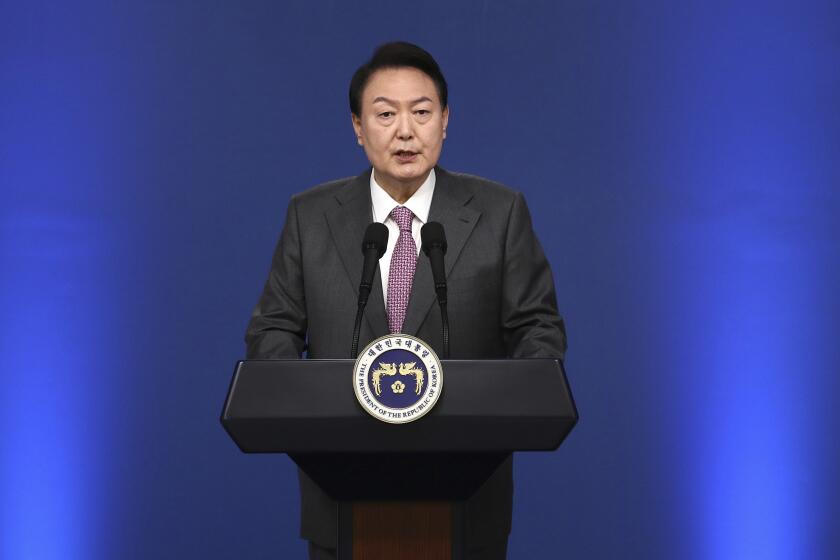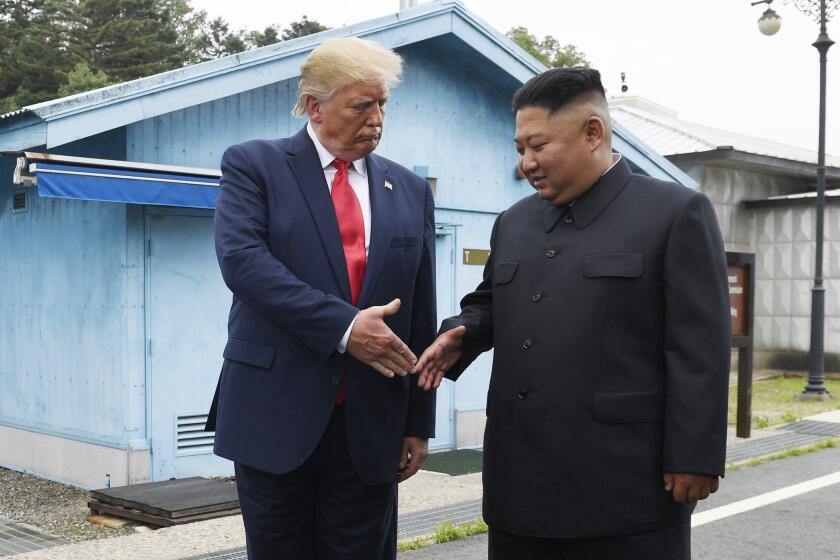Harris caps her Asia trip with a stop at the DMZ dividing North and South Korea

- Share via
PANMUNJOM, Korea — Vice President Kamala Harris capped her four-day trip to Asia with a stop Thursday at the demilitarized zone dividing the Korean peninsula as she emphasized the “ironclad” U.S. commitment to the security of its Asian allies in the face of an increasingly hostile North Korea.
The visit comes on the heels of North Korea’s latest missile launches and amid fears that the country may conduct a nuclear test. Visiting the DMZ has become something of a ritual for American leaders hoping to show their resolve to stand firm against aggression.
North Korea fired two short-range ballistic missiles Wednesday while Harris was in Japan, and had fired one before she left Washington on Sunday. The launches contribute to a record level of missile testing this year that is intended to move Pyongyang closer to being acknowledged as a full-fledged nuclear power.
At the DMZ, Harris went to the top of a ridge, near guard towers and security cameras. The vice president looked through binoculars as a South Korean colonel pointed out military installations on the southern side. Then an American colonel pointed out some of the defenses along the military demarcation line, including a fence topped with barbed wire and Claymore mines. He said U.S. soldiers regularly patrol along a path.
“It’s so close,” Harris said.
Harris then visited one of a row of blue buildings that straddle the demarcation line, where a U.S. officer explained how the buildings are still used to conduct negotiations with North Korea. Sometimes negotiators pass messages back and forth, and sometimes they use a megaphone, he said.
North Korean leader Kim Jong Un is stressing his country will never abandon the nuclear weapons and missiles it needs to counter hostilities from the United States.
“That’s high-tech,” Harris joked, before adding: “We’ve stepped into history.”
“It’s still going,” the colonel said.
Harris agreed. “The past and present are happening every day.”
She then walked out of the building and up to the demarcation line. On the North Korean side, two figures dressed in what appeared to be hazmat suits peeked out from behind a curtain in a second-floor window. Then they disappeared back inside.
South Korea’s president calls for more diplomacy in the face of growing North Korean nuclear weapons capabilities.
Harris described the North Korean missile launches as provocations meant to “destabilize the region” and said the U.S. and South Korea remained committed to the “complete denuclearization” of the North.
“I cannot state enough that commitment of the United States to the defense of the Republic of Korea is ironclad,” she said.
“In the South, we see a thriving democracy. In the North, we see a brutal dictatorship,” she said before departing on a U.S. military helicopter.
Earlier, Harris met with South Korean President Yoon Suk-yeol at his office in Seoul, where they condemned North Korea’s intensifying weapons tests and reaffirmed the U.S. commitment to defend the South militarily in the event of war, Yoon’s office said.
Trump’s ‘fire and fury’ strategy didn’t work, but will Biden’s? Intelligence officials worry Kim is up to something, especially as Biden visits South Korea this week.
They expressed concern over North Korea’s threats of nuclear conflict and pledged an unspecified stronger response to its major provocations, including a nuclear test, which South Korean officials say could possibly take place in coming months.
Harris and Yoon were also expected to discuss expanding economic and technology partnerships and repairing recently strained ties between Seoul and Tokyo to strengthen their trilateral cooperation with Washington in the region.
Their meeting also touched on Taiwan, with both reaffirming their countries’ support for “peace and stability” in the Taiwan Strait, according to Yoon’s office, which didn’t elaborate.
Harris’ trip was organized so that she could attend the state funeral of former Japanese Prime Minister Shinzo Abe, but her itinerary was dominated by security concerns, a reflection
of fears about China’s growing power and North Korea’s ramped-up testing.
Breaking News
Get breaking news, investigations, analysis and more signature journalism from the Los Angeles Times in your inbox.
You may occasionally receive promotional content from the Los Angeles Times.
In every meeting, Harris tried to lay to rest any fears that the U.S. was wavering in its commitment to protect its allies, describing partnerships with South Korea and Japan as the “linchpin” and “cornerstone” of America’s defense strategy in Asia.
Yoon, who took office this year, had anchored his election campaign with vows to deepen Seoul’s economic and security partnership with Washington to navigate challenges posed by the North Korean threat and address potential supply chain risks caused by the COVID-19 pandemic, the U.S.-China rivalry and Russia’s war on Ukraine. But the alliance has been marked by tension recently.
South Koreans have expressed a sense of betrayal over a new law signed by President Biden that prevents electric cars built outside North America from being eligible for U.S. government subsidies, undermining the competitiveness of automakers such as Seoul-based Hyundai.
During their meeting, Harris told Yoon that the Biden administration would continue to consult with Seoul and try to address South Korean concerns as the law is implemented, Yoon’s office said.
Even though battery costs are rising, auto companies are rolling out more affordable electric vehicles that should widen their appeal to a larger group of buyers.
Scott Snyder, a senior fellow for Korea studies at the Council on Foreign Relations, said the dispute over electric vehicles has swiftly become a firestorm that U.S. officials cannot ignore, although there may not be a simple solution.
“It’s taking on a level of urgency that’s making it into a political problem that requires management,” Snyder said. “I don’t know that it’s going to be easy for the Biden administration to do that.”
After meeting Yoon, Harris held a roundtable with female leaders in business, media, culture and sports on gender equity issues.
Yoon has faced criticism for the lack of female representation in government and his downplaying of broader inequalities. He claimed during his campaign that South Korea no longer has any structural barriers to women’s success, which experts say ignored the country’s large gender pay gaps and the underrepresentation of women in corporate boardrooms and politics.
“If we want to strengthen democracy, we must pay attention to gender equity,” said Harris, who said she raised the issue with Yoon. The president’s office didn’t immediately provide confirmation.
More to Read
Get the L.A. Times Politics newsletter
Deeply reported insights into legislation, politics and policy from Sacramento, Washington and beyond. In your inbox three times per week.
You may occasionally receive promotional content from the Los Angeles Times.













